|
Size: 2613
Comment:
|
Size: 12551
Comment:
|
| Deletions are marked like this. | Additions are marked like this. |
| Line 5: | Line 5: |
| == March 2016, 09 (Wednesday) == * We got the telescope at around 4am (Hervé and Alexandre) - to complete * focus on 3C84 * otf maps on HFLS3 * We took over in the morning around 9am (Juan and Anaëlle). Opacity around 0.35 at the begining, rising up to ~1 when we stopped at 3:30pm * 15 otf maps on PSZ1_G046 (faint extended source) * A lot of focus/pointing on Uranus but unstable conditions: not very robust results * Acquisition crashed twiced due to cards failing * @focusOTF on Uranus: works well except we have to compare the resulting FWHM by hand between the different focus iterations * At very high opacities but aiming at pipeline test so should be useful: OTF maps on Uranus with different scanning velocities and angle of scanning with script zigzagtest.pro. Done with scan speed 20arcsec/sec and 40arcsec/sec but stopped due to snow == March 2016, 08 (Tuesday) == We could not observe during the night because of bad weather. We started observations after maintenance. Unfortunately, there were first problems with PaKo and then with the telescop due to changes in mrt-lx1. After solving those problems we started normal observations but could not observe planets. ''' OBSERVATIONS FITH DAY ''' * We got the telescope at around 6pm after technical time and a few issues with the nika2 disks (disks full) * We observe from 6pm to 10pm (Juan and Anaëlle) then get the telescope back at 4am during the night (Hervé and Alexandre taking over) * First shift: opacity was good (about 0.2 @1mm) * Pointing / focus session on 3C84. Focus X and Focus Y not very stable but found a good Focus Z * Map of 3C84 at elevation 57° * No more planet in the sky at UT 18: decide to go on faint sources. We observed CXTau (10 mJy at 1mm T-Tauri disk) for about two hours. The sourec is detected at 1mm and tentatively detected at 2mm. See http://www.iram.es/IRAMES/mainWiki/OffProcNika2Run4 Improved map making to be carried out. ------------------------------------------------------------------------------------------- == March 2016, 07 (Monday) == ''' OBSERVATIONS FOURTH DAY ''' * We took the telescope at 02:00. During the first part of the night the opacity was low (about 0.15 @1mm) and the sky quite stable. Then the opacity started to increase slowly until 0.35. In the morning the sky was complete covered by clouds and the opacity increased up to 0.6. * The acquisition at sampling frequency equal to 47Hz worked for the whole night. * Main observations today: * '''Polarisation:''' - 3X3 maps following the quasars 3C286, 3C279, 3C273 (X68) - 1 skydip with HWP on the beam stopped - 3X3 maps of NGC7538 (X12) * for several maps we stored compressed and normal files. At the end of the day we had bad weather and did not observe. ------------------------------------------------------------------------------------------- == March 2016, 06 (Sunday) == ''' OBSERVATIONS THIRD DAY ''' * We took the telescope at 11:18 after the snow storm in the night. After heating on the mirrors and pointing close to the sun, still a piece of ice is on the sub-reflector. We are afraid not to observe in best conditions. 5K temperature gradients between primary and subreflector (in normal operations is lower then 1K). After starting, opacity is low but the sky is not stable at all. * Hard to optimise pointing and in particular focus * Main observations today: * '''Intensity:''' - 1 Beam maps (Uranus, telescope speed = 60arcsec/sec). - 1 skydip without HWP on the beam * '''Polarisation:''' - 4X4 maps on Uranus (X4) * All the observations are made at sampling frequency equal to 23Hz. ------------------------------------------------------------------------------------------- == March 2016, 05 (Saturday) == ''' OBSERVATIONS THIRD DAY ''' * We started at 5am because of the snow. Then Opacities around between 0.15 and 0.35 (@1mm) during the night/day. Atmosphere not stable during all the observations. * Main observations today: * '''Intensity:''' - 2 Beam maps (3C286, Mars). - About 12 min integration on cluster RXJ1347-1145. - 3X3 map on NGC7538 (X4 maps) with the HWP on the beam stopped * '''Polarisation:''' - 3X3 map on 3C286 (X4 maps) - 3X3 map on NGC7538 (X6 maps) - 16X16 maps on casA (splitted in three different maps) - 4X4 maps on Uranus (X19) - 2 skydips performed with HWP on the beam (the first with HWP on, the second with the HWP stopped) * Syncronization errors every few minutes when we tried to observe at sampling frequency equal to 47Hz. We switched then to the nominal 23Hz even for polarisation observations. Few synchronisation problem occurred anyway, in particular from 12:00 to 16:00 (probably because many persons worked on nika2 with IDL at the same time). ------------------------------------------------------------------------------------------- == March 2016, 04 (Friday) == ''' OBSERVATIONS THIRD DAY ''' * Opacities around 0.25 (@1mm) and 0.18 (@2mm) during the night/day. Atmosphere pretty stable during all the observations. * Main observations today: - several maps on secondary calibrators (LKH234,NGC7027,CEPA,CRL2688,MWC349,K3-50A,G45.1,GL490,W3OH). - Observation of NGC891 in intensity (@nkotf 20 20 -22.5 0 20 40 radec and @nkotf20 20 67.5 0 20 40 radec) - 1 Beam maps on Uranus (telescope speeds - 78arcsec/s) and 2 beam maps on 3C279 (with telescope speeds - 70 and 60 arcsec/s). - About 1h10 integration on cluster RXJ1347-1145. - Second part of focus session. * Syncronization problems when we try to change the sampling frequency from 23Hz up to 47Hz to observe in polarisation. We are trying to solve this problem, otherwise we keep the nominal sampling frequency for both polarisation and intensity observations. ------------------------------------------------------------------------------------------- We observed some secondary calibrators this night. Here are the maps of K3-50A and MWC349 we computed using a first analysis with nk_rta. {{attachment:K3-50A.png||height=300}} {{attachment:MWC349.png||height=300}} We also had the oportunity to observe RXJ1347 for '''1h13min''' before the secondary calibrators became available. The following figure is the S/N map we get from the coaddition of the scans at 2 mm we reduced using a common_mode_kids_out decorrelation method (the dual_band_dec method leaves to much noise on the map so the S/N is reduced). The color bar is not diplayed because the noise properties have not been estimated yet. Therefore the S/N values are wrong. The SZ pic position is consistent with the one measured with the NIKA observations. Such a result is promising given the rather small integration time for an SZ observation ! {{attachment:RXJ1347_bis.png||height=400}} We analyzed the beammaps made on Uranus yesterday morning at two different scan velocities (60 and 70"/sec). The beammaps were made at elevations higher than 30 degrees whereas this previous test realized on Mars on wednesday included a beammap measured at a mean elevation of 15 degree... The first three figures in the following show the results we get from the beammap scan made at 60"/sec (20160303s89_90_91) and the other three show the results we get from the beammap scan made at 70"/sec (20160303s86_87_88). It seems therefore than the scan velocity does not have a significant effect on the beam recovered shape and position in the focal plane. This conclusion has to be strengthened with more statistics so we will repeat this kind of observation tonight. {{attachment:A1_Uranus_60.png||height=400}} {{attachment:A2_Uranus_60.png||height=400}} {{attachment:A3_Uranus_60.png||height=400}} {{attachment:A1_Uranus_70.png||height=400}} {{attachment:A2_Uranus_70.png||height=400}} {{attachment:A3_Uranus_70.png||height=400}} == March 2016, 03 (Thursday) == ''' OBSERVATIONS SECOND DAY ''' * Opacities around 0.35 (@1mm) and 0.2 (@2mm) during the night then increases up to 0.45 at 1mm. Atmosphere pretty stable in the night, much less stable during the day. * Main observations today: about 4 hours integration on a deep field. 2 Beam maps on Uranus (2 with different telescope speeds - 60arcsec/s and 70arcsec/s). Focus session (mapping the focal plane with small maps on Uranus in order to detect deformations from flatness) - 20 points performed (with some redundancy on the center of the arrays). During the observation of the last 3 of these points a synchronisation problem in the acquisition occurred. * We got a good skydip 20160303s36 to compute C0 and C1. ------------------------------------------------------------------------------------------- We analyzed the first beammap we made yesterday on Mars (scan velocity of 60arcsec/s). As shown on the following figures, two feedlines on array 1 and 3 were very noisy so the recovered sensitivities are quite bad for these KIDs. We get 1014/1140 = 89% valid detectors on array 1, 847/1020 = 83% on array 2 and 918/1140 = 81% on array 3. {{attachment:A1_sensitivity_Mars.png||height=400}} {{attachment:A2_sensitivity_Mars.png||height=400}} {{attachment:A3_sensitivity_Mars.png||height=400}} We also analyzed the last beammap made on Uranus. As shown on the following figures there were no more noisy feedline but one electronic box on array 1 was not working during the acquisition. We therefore lost all the corresponding KIDs. We get 875/1140 = 77% valid detectors on array 1, 844/1020 = 83% on array 2 and 906/1140 = 79% on array 3. {{attachment:A1_sensitivity_Uranus.png||height=400}} {{attachment:A2_sensitivity_Uranus.png||height=400}} {{attachment:A3_sensitivity_Uranus.png||height=400}} |
|
| Line 11: | Line 207: |
| * Main goals today: about 2h30 integration on faint source (NEP-L about 35mJy@1mm). Beam maps on Mars (2 with different telescope speeds - 60''/s and 70''/s) and 1 on Uranus (with nominal telescope speed 60''/s) * We got a good skydip 20160302s49 to compute C0 and C1. * Before each map we performed several pointing-focus-pointing sessions (good boys!) |
* Main observations today: about 2h30 integration on faint source (NEP-L about 35mJy@1mm). Beam maps on Mars (2 with different telescope speeds - 60arcsec/s and 70arcsec/s) and 1 on Uranus (with nominal telescope speed 60arcsec/s) * We got a good skydip 20160302s49 to compute C0 and C1. * Before each map we performed several pointing-focus-pointing sessions (good boys!) |
Back to the NIKA2 run 4 main page
Contents
March 2016, 09 (Wednesday)
* We got the telescope at around 4am (Hervé and Alexandre) - to complete
- focus on 3C84
- otf maps on HFLS3
* We took over in the morning around 9am (Juan and Anaëlle). Opacity around 0.35 at the begining, rising up to ~1 when we stopped at 3:30pm
- 15 otf maps on PSZ1_G046 (faint extended source)
- A lot of focus/pointing on Uranus but unstable conditions: not very robust results
- Acquisition crashed twiced due to cards failing
- @focusOTF on Uranus: works well except we have to compare the resulting FWHM by hand between the different focus iterations
- At very high opacities but aiming at pipeline test so should be useful: OTF maps on Uranus with different scanning velocities and angle of scanning with script zigzagtest.pro. Done with scan speed 20arcsec/sec and 40arcsec/sec but stopped due to snow
March 2016, 08 (Tuesday)
We could not observe during the night because of bad weather. We started observations after maintenance. Unfortunately, there were first problems with PaKo and then with the telescop due to changes in mrt-lx1. After solving those problems we started normal observations but could not observe planets.
OBSERVATIONS FITH DAY
* We got the telescope at around 6pm after technical time and a few issues with the nika2 disks (disks full)
* We observe from 6pm to 10pm (Juan and Anaëlle) then get the telescope back at 4am during the night (Hervé and Alexandre taking over)
* First shift: opacity was good (about 0.2 @1mm)
- Pointing / focus session on 3C84. Focus X and Focus Y not very stable but found a good Focus Z
- Map of 3C84 at elevation 57°
No more planet in the sky at UT 18: decide to go on faint sources. We observed CXTau (10 mJy at 1mm T-Tauri disk) for about two hours. The sourec is detected at 1mm and tentatively detected at 2mm. See http://www.iram.es/IRAMES/mainWiki/OffProcNika2Run4 Improved map making to be carried out.
March 2016, 07 (Monday)
OBSERVATIONS FOURTH DAY
- We took the telescope at 02:00. During the first part of the night the opacity was low (about 0.15 @1mm) and the sky quite stable. Then the opacity started to increase slowly until 0.35. In the morning the sky was complete covered by clouds and the opacity increased up to 0.6.
- The acquisition at sampling frequency equal to 47Hz worked for the whole night.
- Main observations today:
* Polarisation:
- 3X3 maps following the quasars 3C286, 3C279, 3C273 (X68)
- 1 skydip with HWP on the beam stopped
- 3X3 maps of NGC7538 (X12)
- for several maps we stored compressed and normal files. At the end of the day we had bad weather and did not observe.
March 2016, 06 (Sunday)
OBSERVATIONS THIRD DAY
- We took the telescope at 11:18 after the snow storm in the night. After heating on the mirrors and pointing close to the sun, still a piece of ice is on the sub-reflector. We are afraid not to observe in best conditions. 5K temperature gradients between primary and subreflector (in normal operations is lower then 1K). After starting, opacity is low but the sky is not stable at all.
- Hard to optimise pointing and in particular focus
- Main observations today:
* Intensity:
- 1 Beam maps (Uranus, telescope speed = 60arcsec/sec).
- 1 skydip without HWP on the beam
* Polarisation:
- 4X4 maps on Uranus (X4)
- All the observations are made at sampling frequency equal to 23Hz.
March 2016, 05 (Saturday)
OBSERVATIONS THIRD DAY
- We started at 5am because of the snow. Then Opacities around between 0.15 and 0.35 (@1mm) during the night/day. Atmosphere not stable during all the observations.
- Main observations today:
* Intensity:
- 2 Beam maps (3C286, Mars).
- About 12 min integration on cluster RXJ1347-1145.
- 3X3 map on NGC7538 (X4 maps) with the HWP on the beam stopped
* Polarisation:
- 3X3 map on 3C286 (X4 maps)
- 3X3 map on NGC7538 (X6 maps)
- 16X16 maps on casA (splitted in three different maps)
- 4X4 maps on Uranus (X19)
- 2 skydips performed with HWP on the beam (the first with HWP on, the second with the HWP stopped)
- Syncronization errors every few minutes when we tried to observe at sampling frequency equal to 47Hz. We switched then to the nominal 23Hz even for polarisation observations. Few synchronisation problem occurred anyway, in particular from 12:00 to 16:00 (probably because many persons worked on nika2 with IDL at the same time).
March 2016, 04 (Friday)
OBSERVATIONS THIRD DAY
- Opacities around 0.25 (@1mm) and 0.18 (@2mm) during the night/day. Atmosphere pretty stable during all the observations.
- Main observations today:
- several maps on secondary calibrators (LKH234,NGC7027,CEPA,CRL2688,MWC349,K3-50A,G45.1,GL490,W3OH).
- Observation of NGC891 in intensity (@nkotf 20 20 -22.5 0 20 40 radec and @nkotf20 20 67.5 0 20 40 radec)
- 1 Beam maps on Uranus (telescope speeds - 78arcsec/s) and 2 beam maps on 3C279 (with telescope speeds - 70 and 60 arcsec/s).
- About 1h10 integration on cluster RXJ1347-1145.
- Second part of focus session.
- Syncronization problems when we try to change the sampling frequency from 23Hz up to 47Hz to observe in polarisation. We are trying to solve this problem, otherwise we keep the nominal sampling frequency for both polarisation and intensity observations.
We observed some secondary calibrators this night. Here are the maps of K3-50A and MWC349 we computed using a first analysis with nk_rta.


We also had the oportunity to observe RXJ1347 for 1h13min before the secondary calibrators became available. The following figure is the S/N map we get from the coaddition of the scans at 2 mm we reduced using a common_mode_kids_out decorrelation method (the dual_band_dec method leaves to much noise on the map so the S/N is reduced). The color bar is not diplayed because the noise properties have not been estimated yet. Therefore the S/N values are wrong. The SZ pic position is consistent with the one measured with the NIKA observations. Such a result is promising given the rather small integration time for an SZ observation !
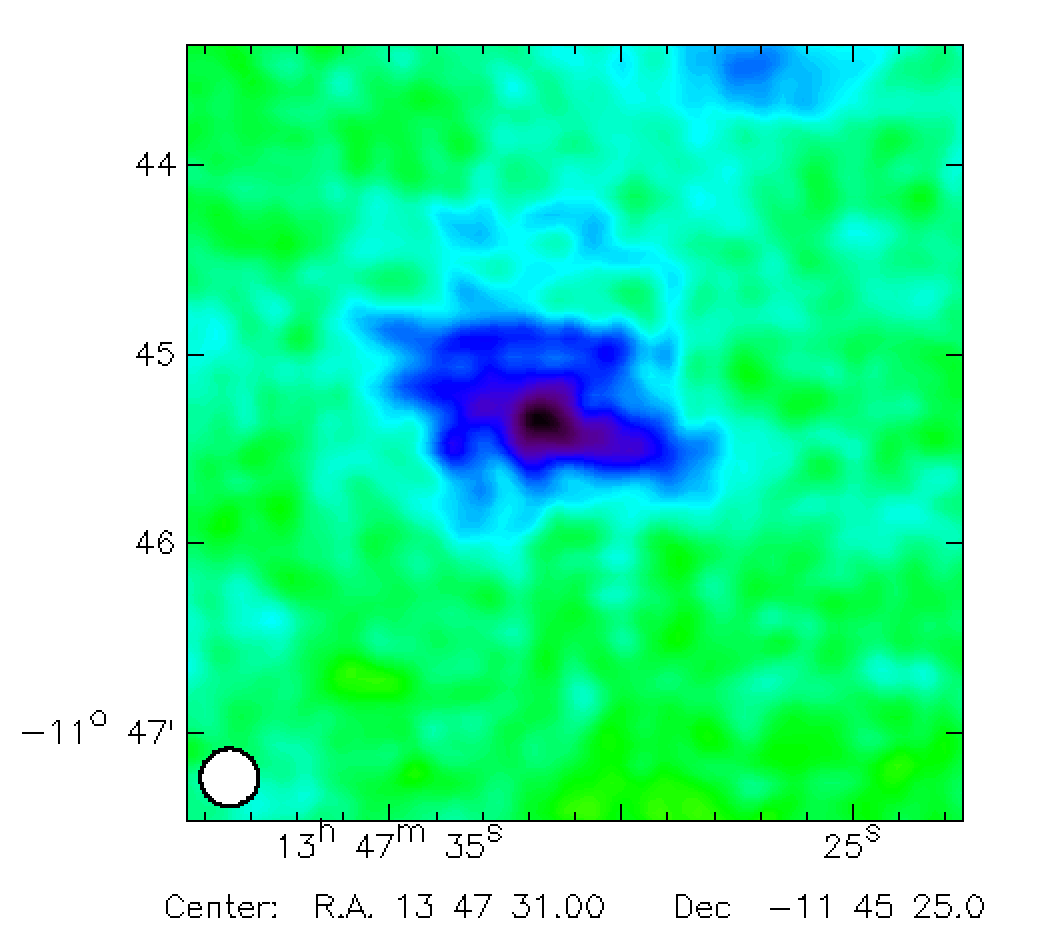
We analyzed the beammaps made on Uranus yesterday morning at two different scan velocities (60 and 70"/sec). The beammaps were made at elevations higher than 30 degrees whereas this previous test realized on Mars on wednesday included a beammap measured at a mean elevation of 15 degree... The first three figures in the following show the results we get from the beammap scan made at 60"/sec (20160303s89_90_91) and the other three show the results we get from the beammap scan made at 70"/sec (20160303s86_87_88). It seems therefore than the scan velocity does not have a significant effect on the beam recovered shape and position in the focal plane. This conclusion has to be strengthened with more statistics so we will repeat this kind of observation tonight.
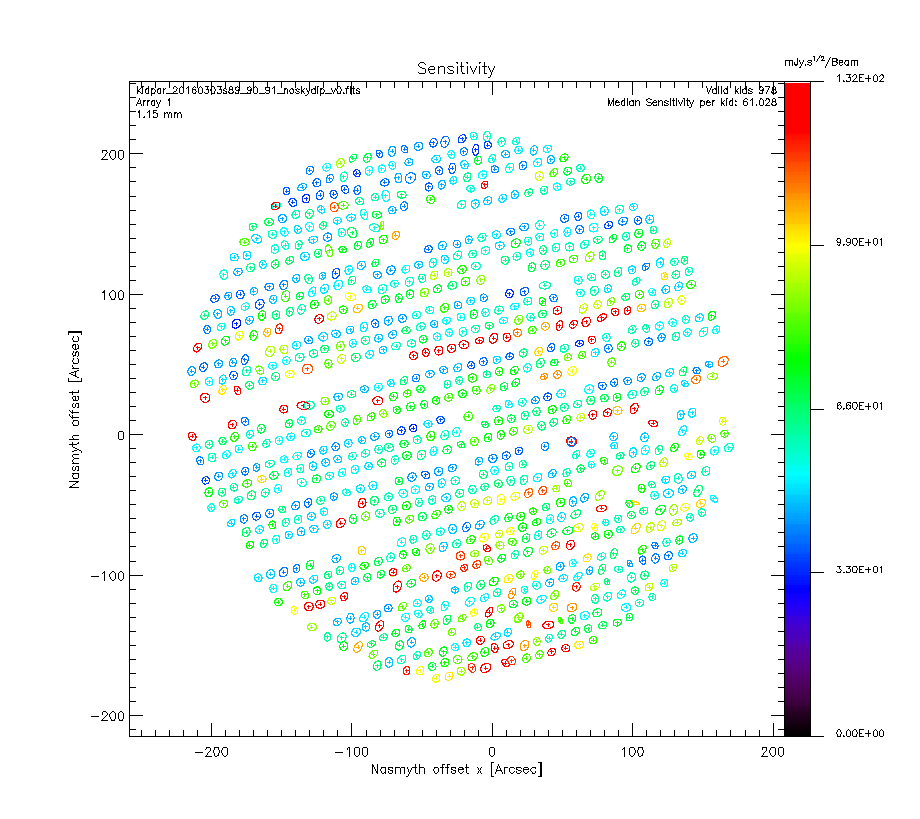
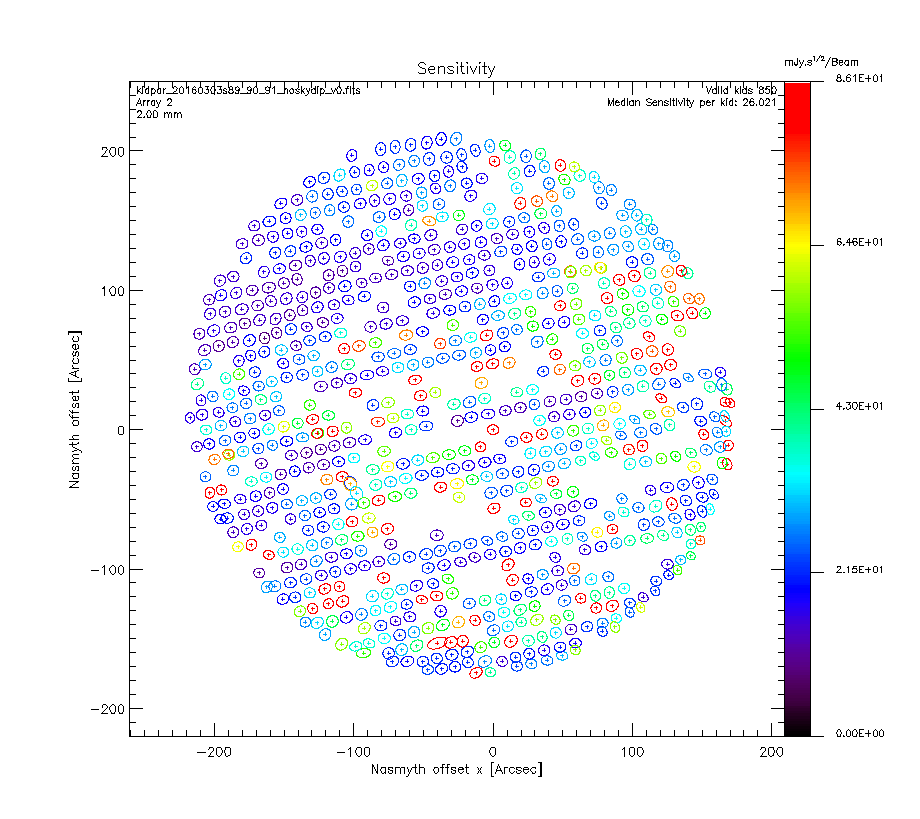
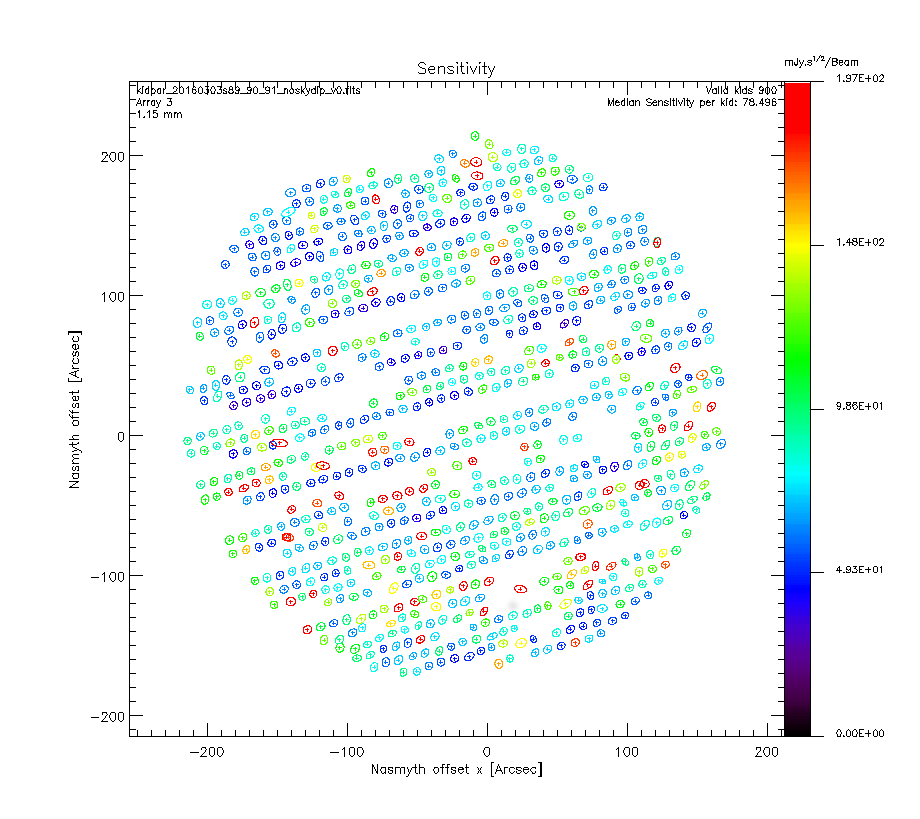
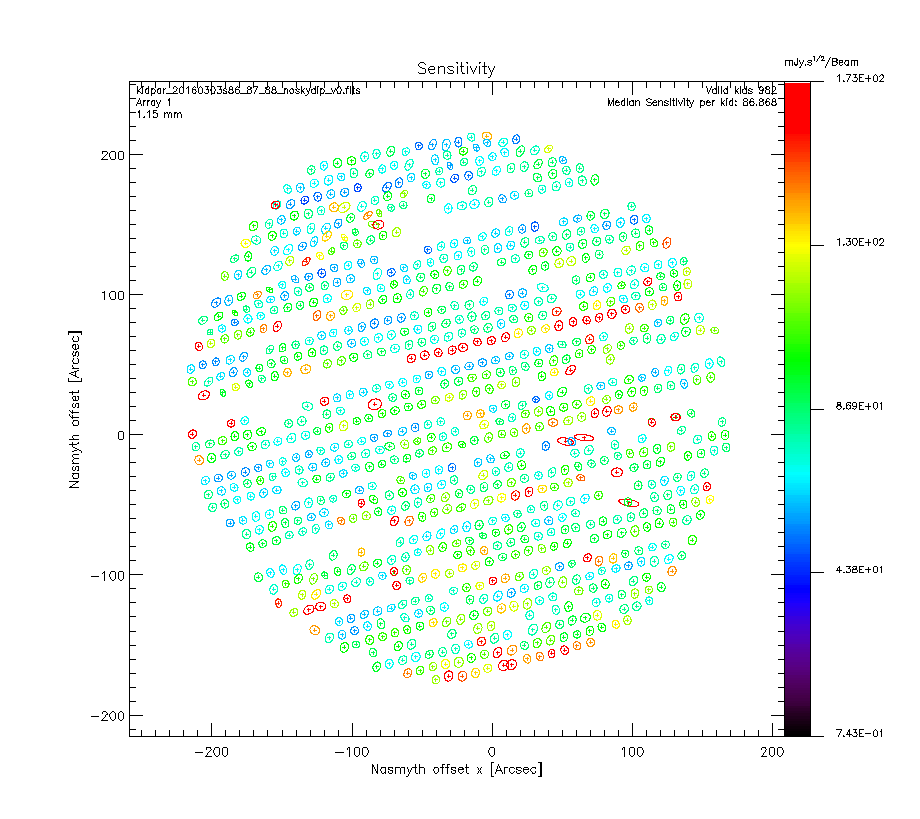
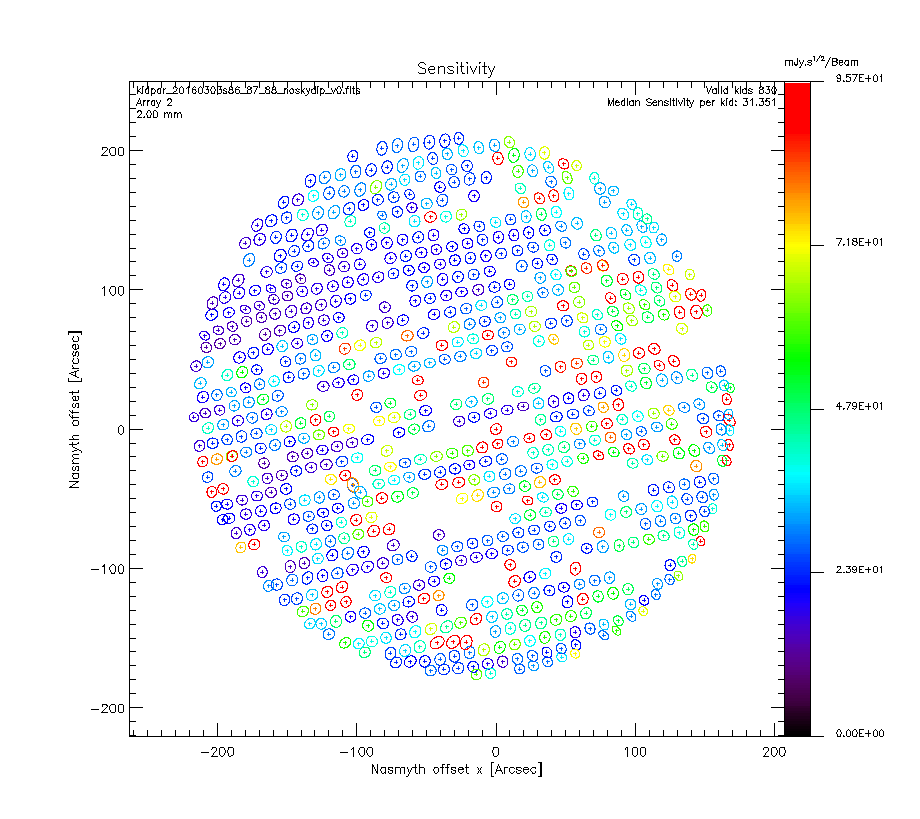
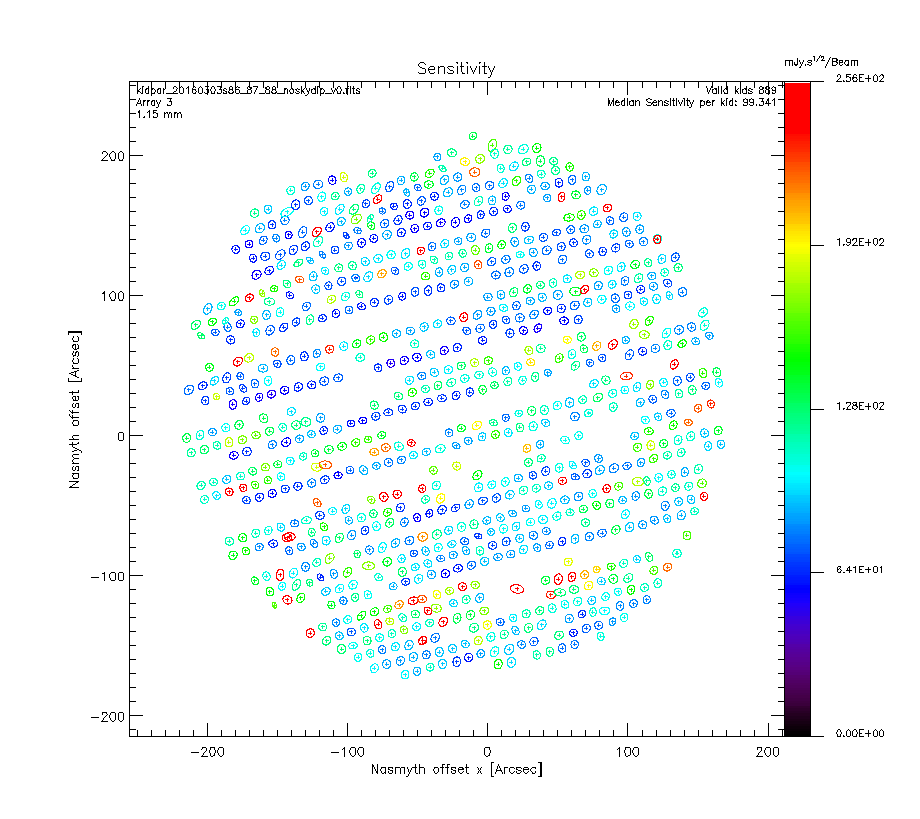
March 2016, 03 (Thursday)
OBSERVATIONS SECOND DAY
- Opacities around 0.35 (@1mm) and 0.2 (@2mm) during the night then increases up to 0.45 at 1mm. Atmosphere pretty stable in the night, much less stable during the day.
- Main observations today: about 4 hours integration on a deep field. 2 Beam maps on Uranus (2 with different telescope speeds - 60arcsec/s and 70arcsec/s). Focus session (mapping the focal plane with small maps on Uranus in order to detect deformations from flatness) - 20 points performed (with some redundancy on the center of the arrays). During the observation of the last 3 of these points a synchronisation problem in the acquisition occurred.
- We got a good skydip 20160303s36 to compute C0 and C1.
We analyzed the first beammap we made yesterday on Mars (scan velocity of 60arcsec/s). As shown on the following figures, two feedlines on array 1 and 3 were very noisy so the recovered sensitivities are quite bad for these KIDs. We get 1014/1140 = 89% valid detectors on array 1, 847/1020 = 83% on array 2 and 918/1140 = 81% on array 3.

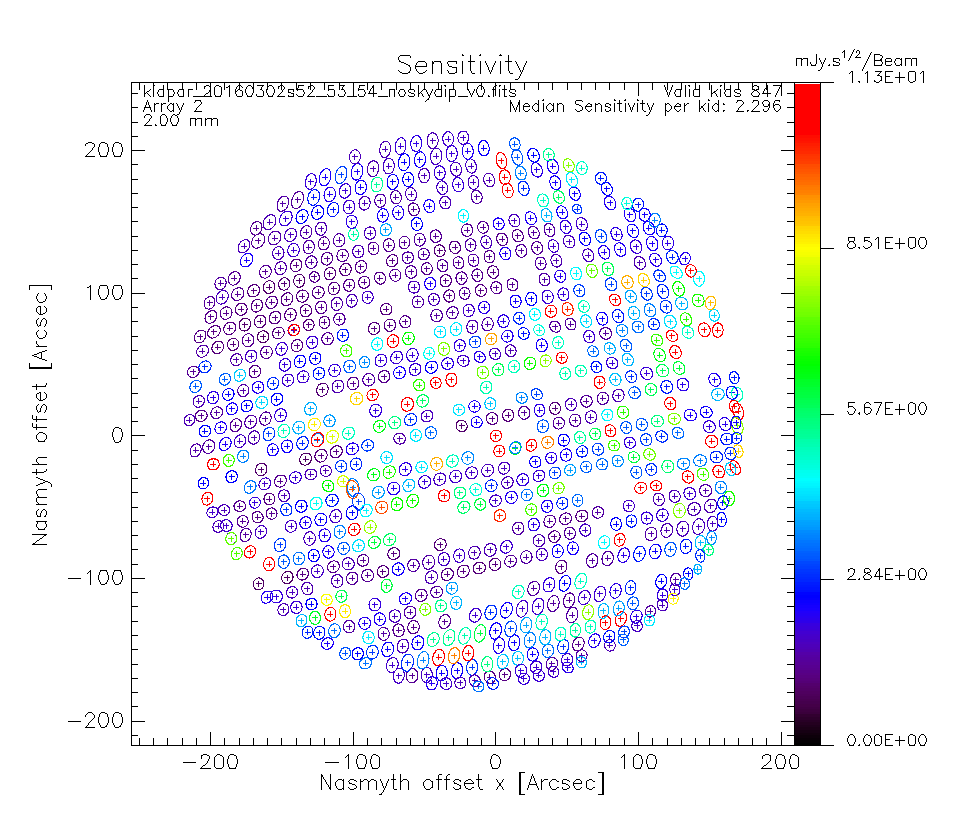
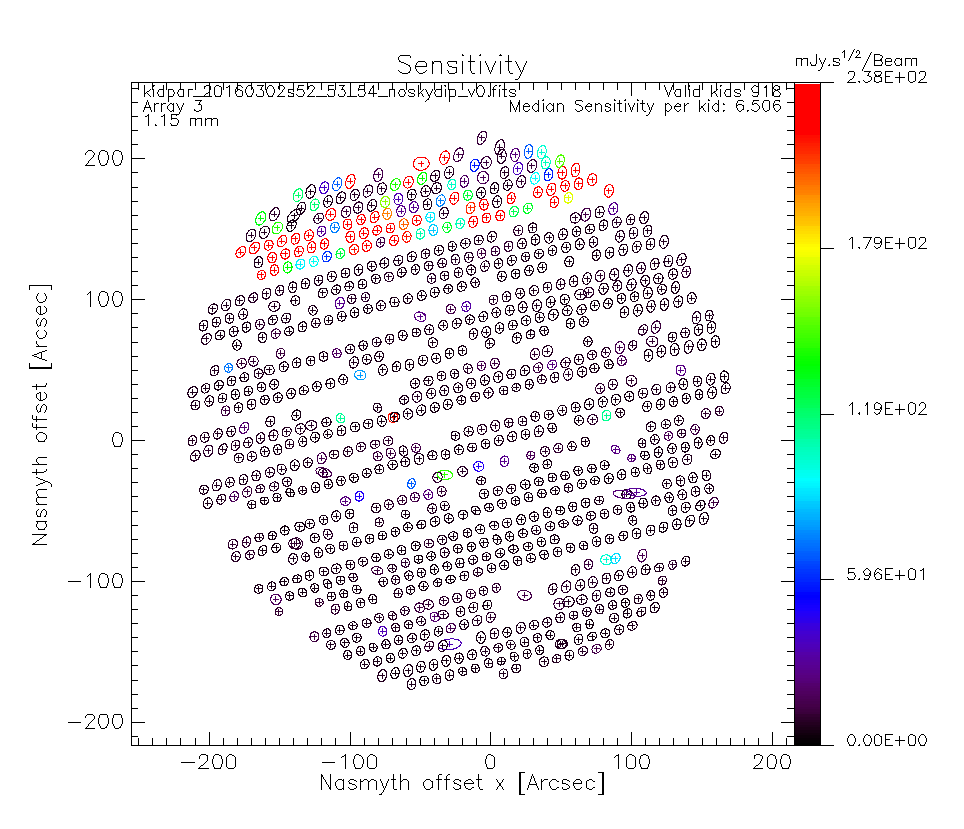
We also analyzed the last beammap made on Uranus. As shown on the following figures there were no more noisy feedline but one electronic box on array 1 was not working during the acquisition. We therefore lost all the corresponding KIDs. We get 875/1140 = 77% valid detectors on array 1, 844/1020 = 83% on array 2 and 906/1140 = 79% on array 3.
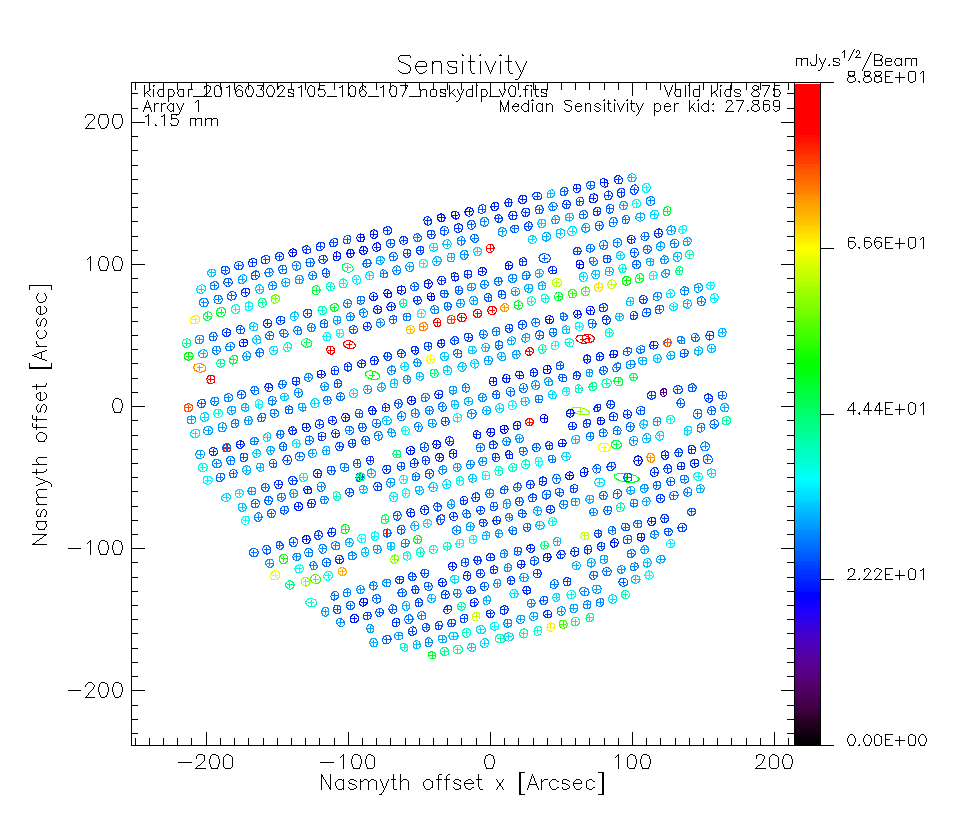
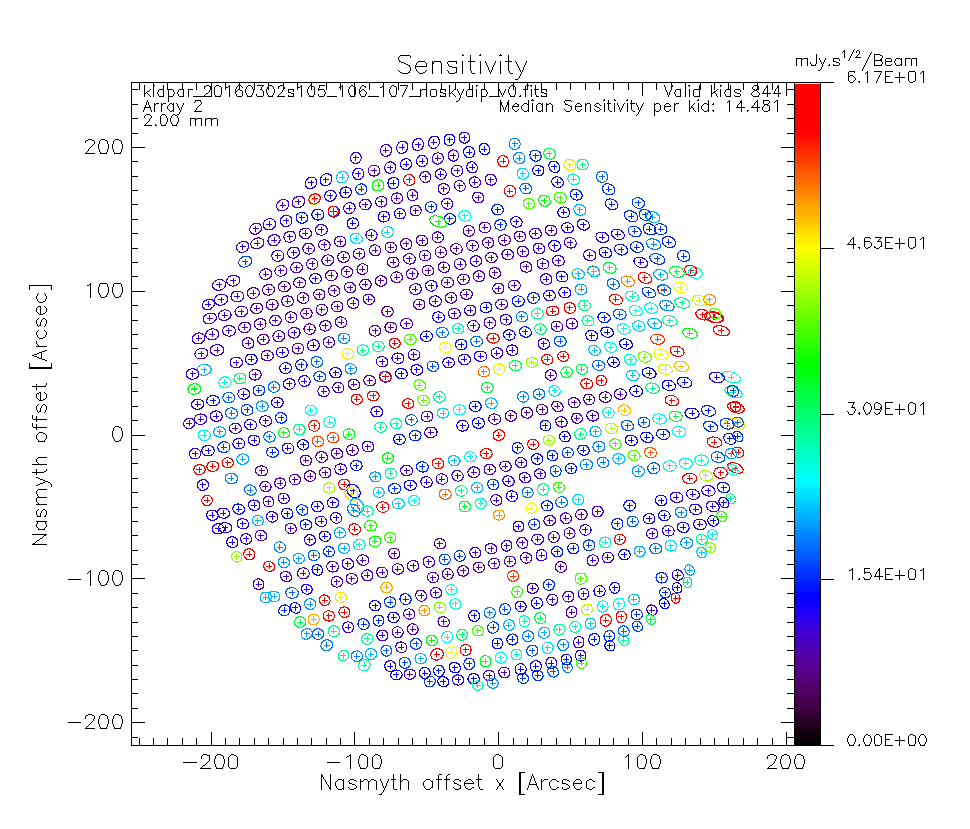

March 2016, 02 (Wednesday)
OBSERVATIONS FIRST DAY
- Opacities around 0.3 (@1mm) and 0.2 (@2mm) during the whole night/day. Atmosphere quite stable as well. Beautiful view!
- Main observations today: about 2h30 integration on faint source (NEP-L about 35mJy@1mm). Beam maps on Mars (2 with different telescope speeds - 60arcsec/s and 70arcsec/s) and 1 on Uranus (with nominal telescope speed 60arcsec/s)
- We got a good skydip 20160302s49 to compute C0 and C1.
- Before each map we performed several pointing-focus-pointing sessions (good boys!)
* 02:00UT We go to the sky for the first time. Clear sky, opacity about 0.2 pretty stable.
The sky noise seems good on the 3 arrays (see the plots below). A little worse on array 3 (1mm NIKEL DC).
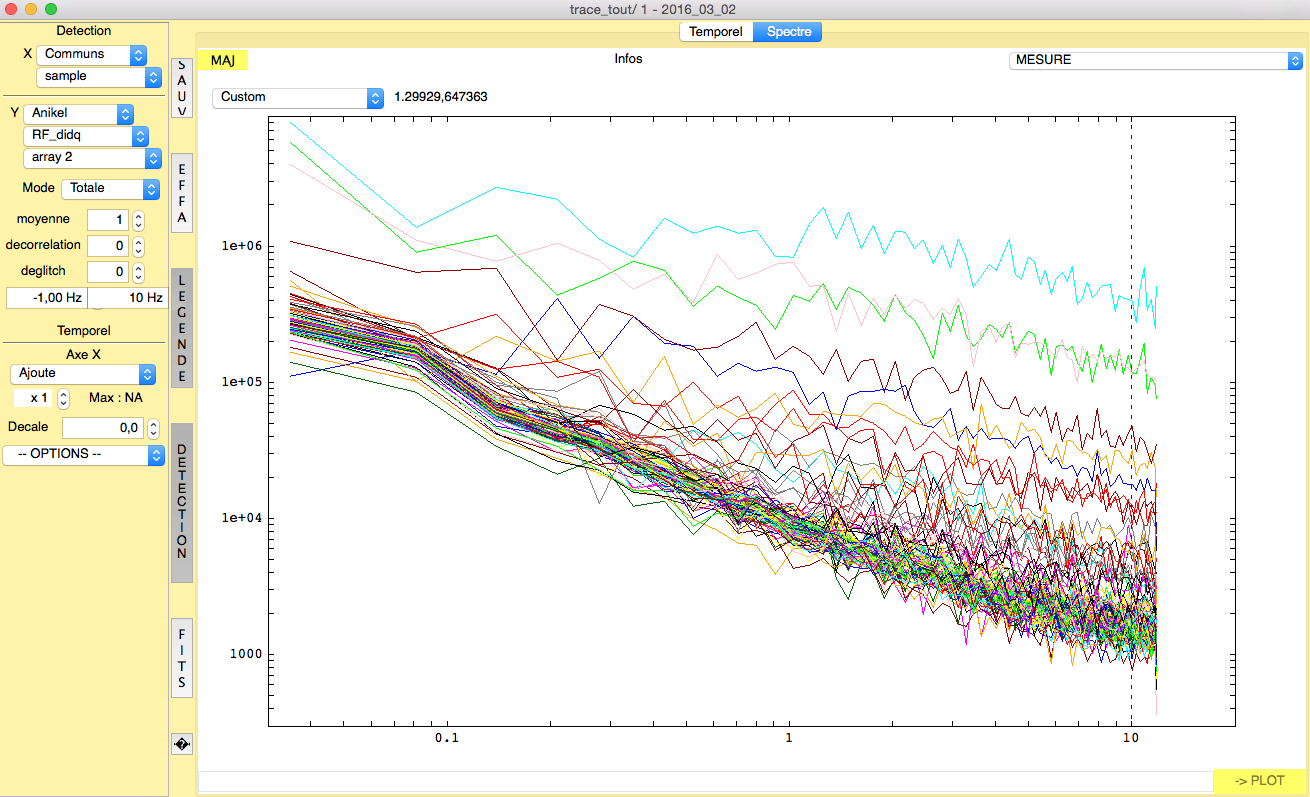
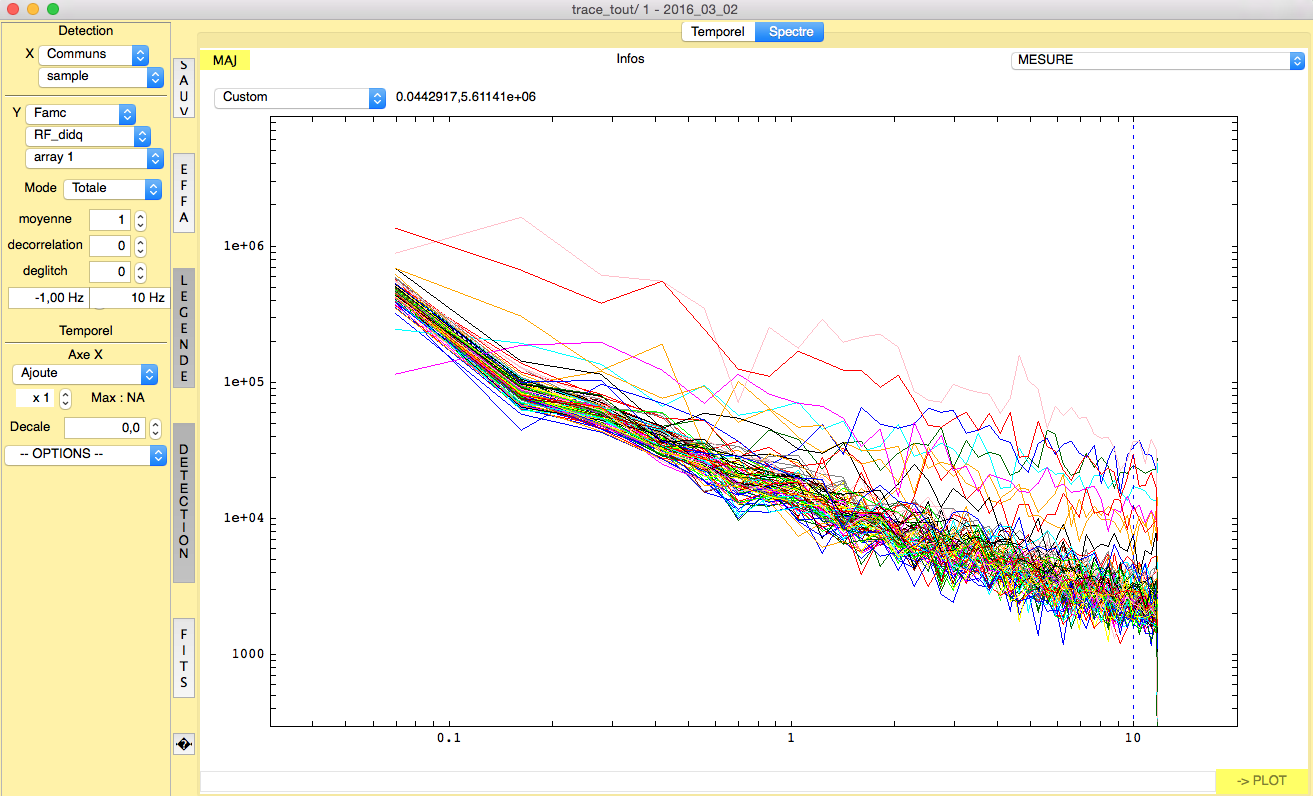
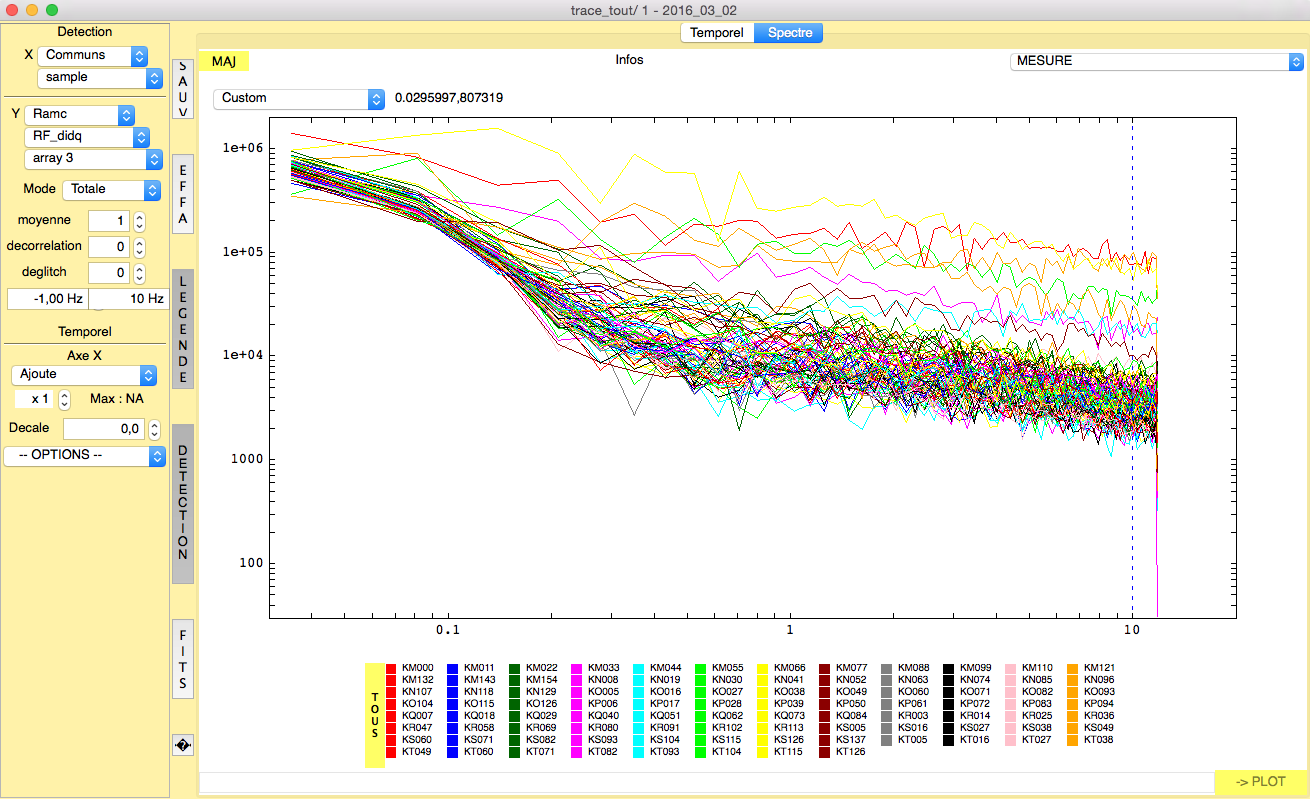
Figure. Noise on the sky for the 2mm, 1mm (array 1) and 1mm (array 3).
* The noise is 1.5Hz/sqrt(Hz), 2Hz/sqrt(Hz), and 3Hz/sqrt(Hz) for the 2mm, 1mm (array 1) and 1mm (array 3) respectively.
February 2016, 29 (Monday)
* Andrea arrived at the telescope.
* Status of the Instrument:
- The cryostat is at the nominam temperature T_100mK=150mK
- All the 20 feedlines are connected.
- The acquisition works nominally (few problems in the morning concerning the ports closed in nika2)
- We are producing normal,compressed and mini file on nika2 and mac12 during the night to check if they are right. First check is ok. We will keep checking tomorrow morning.
- We checked the modulation of the HWP and all the polarisation facilities of nika2. It seems to work nominally.
Hereafter some plot to check the good health of NIKA2:
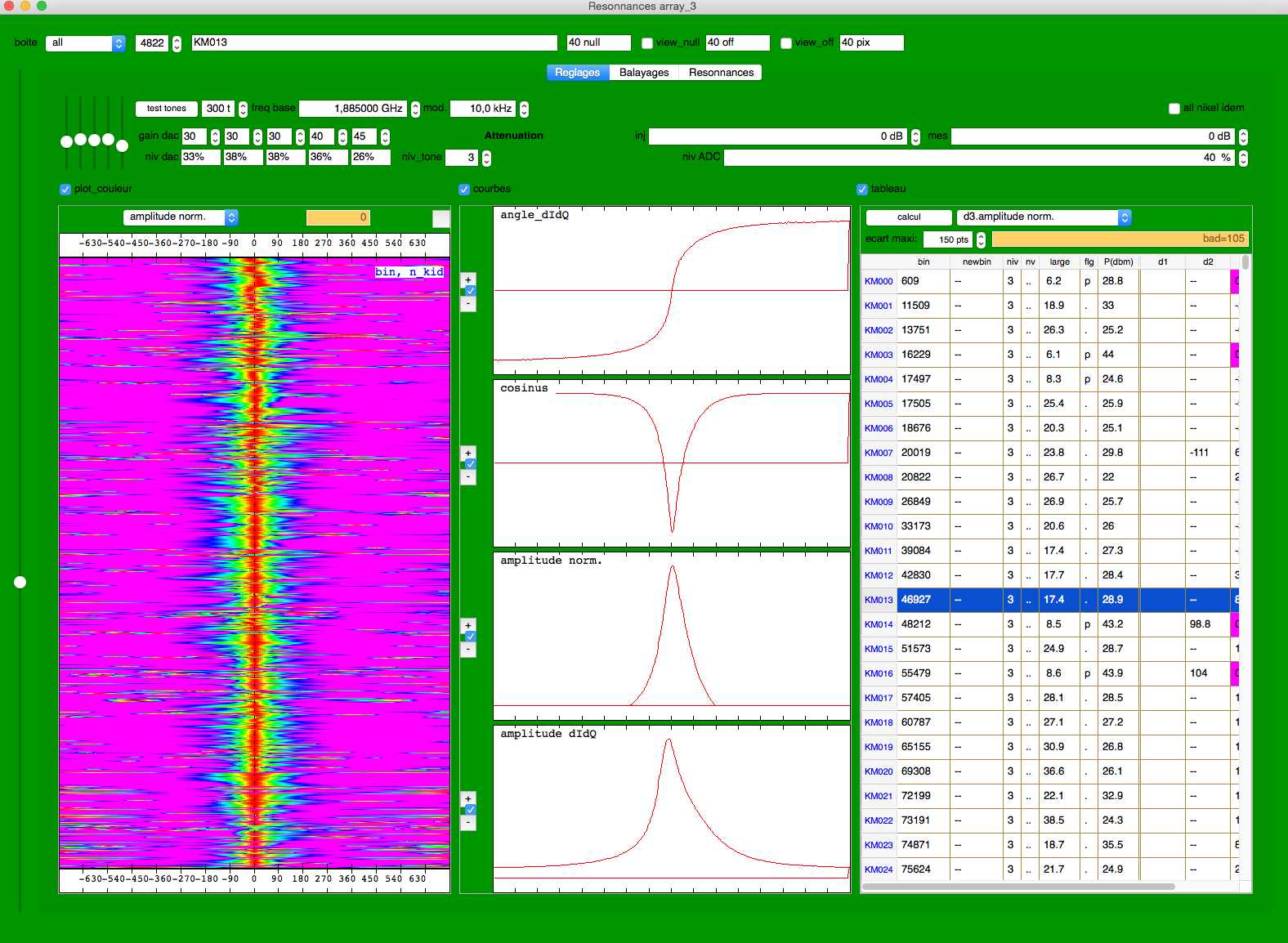
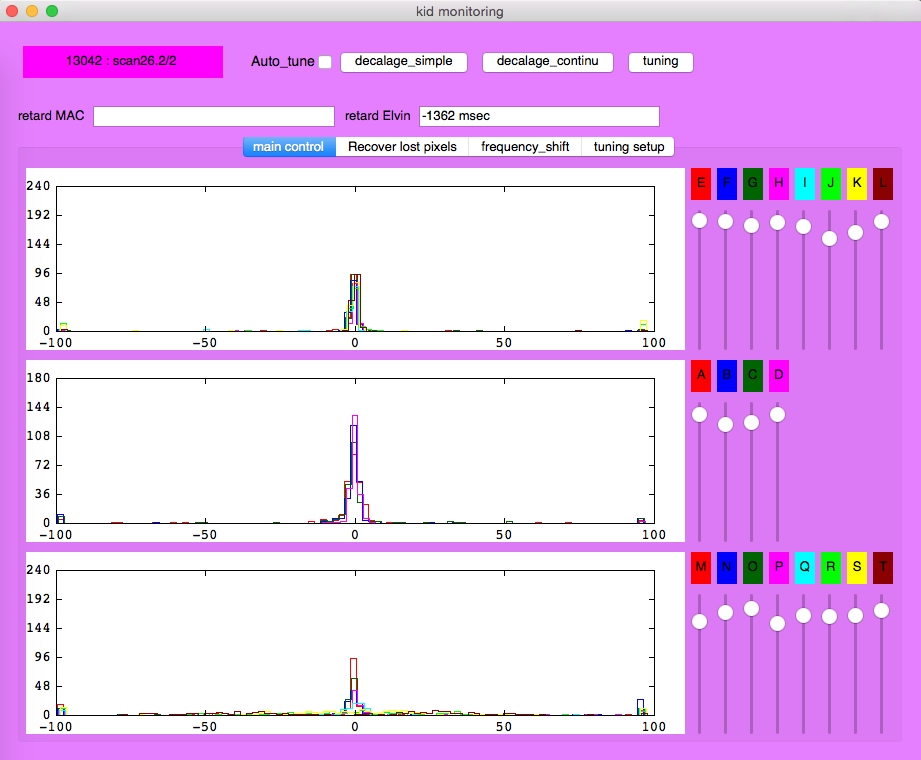
Figure. Left: trace of the 1140 pixels of array 3; right: monitor with all the 20 boards tuned.
THE NOISE is taken with the window on the cryostat. It is in agreement with the previous observing campaign. No traces of the pulse tube.
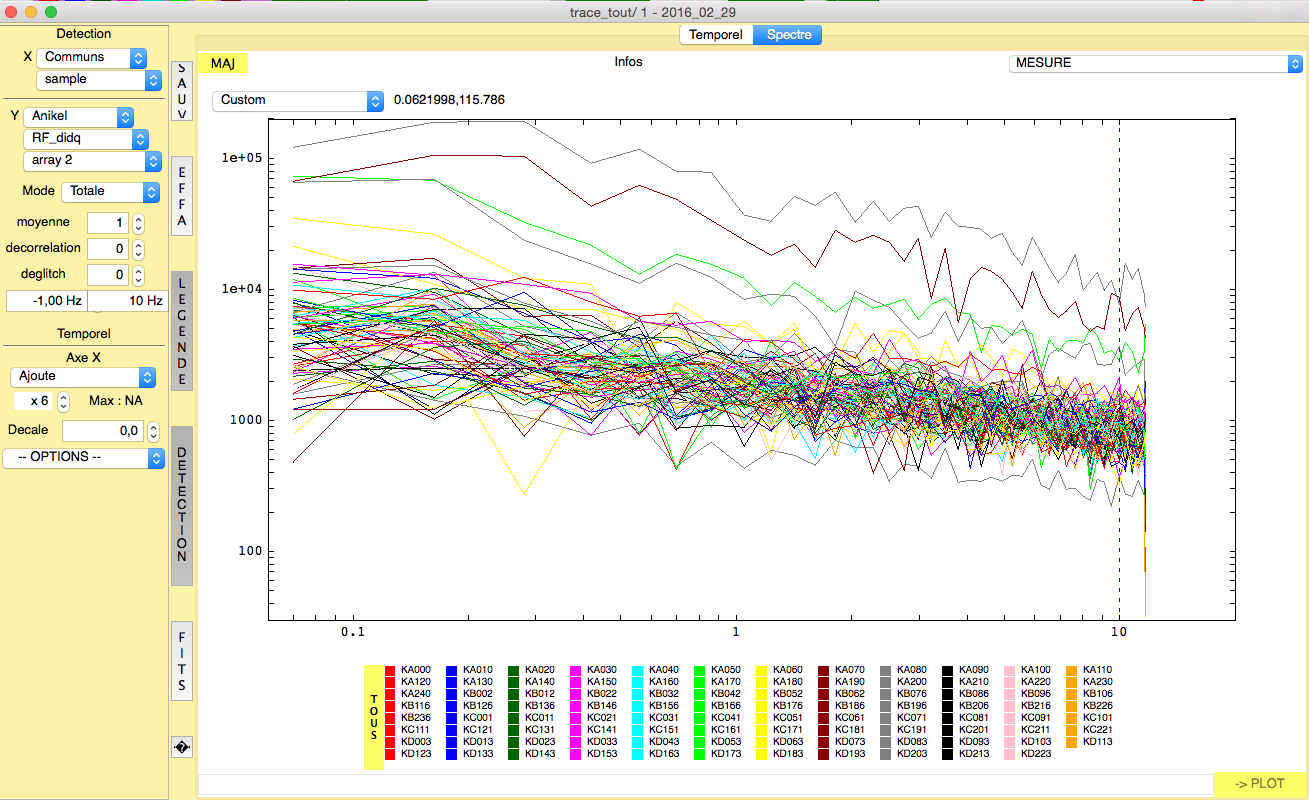
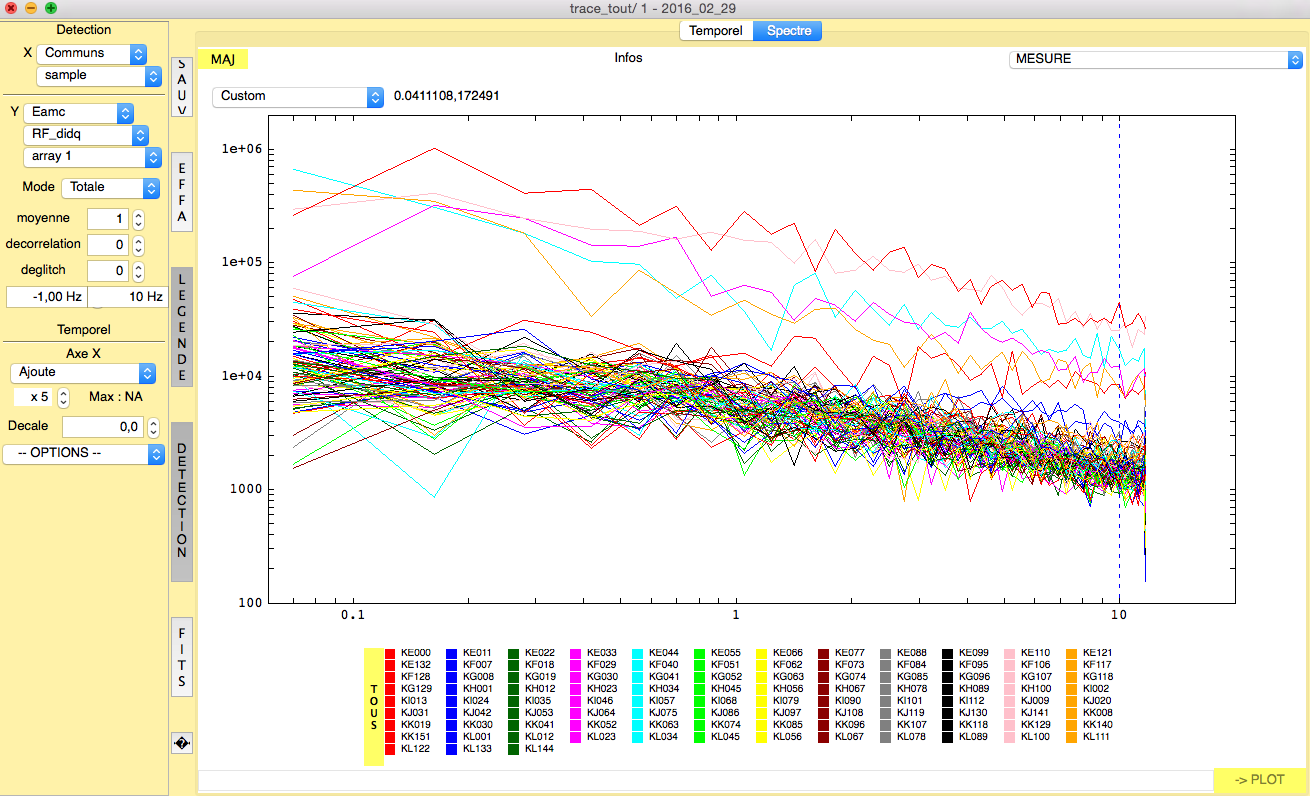
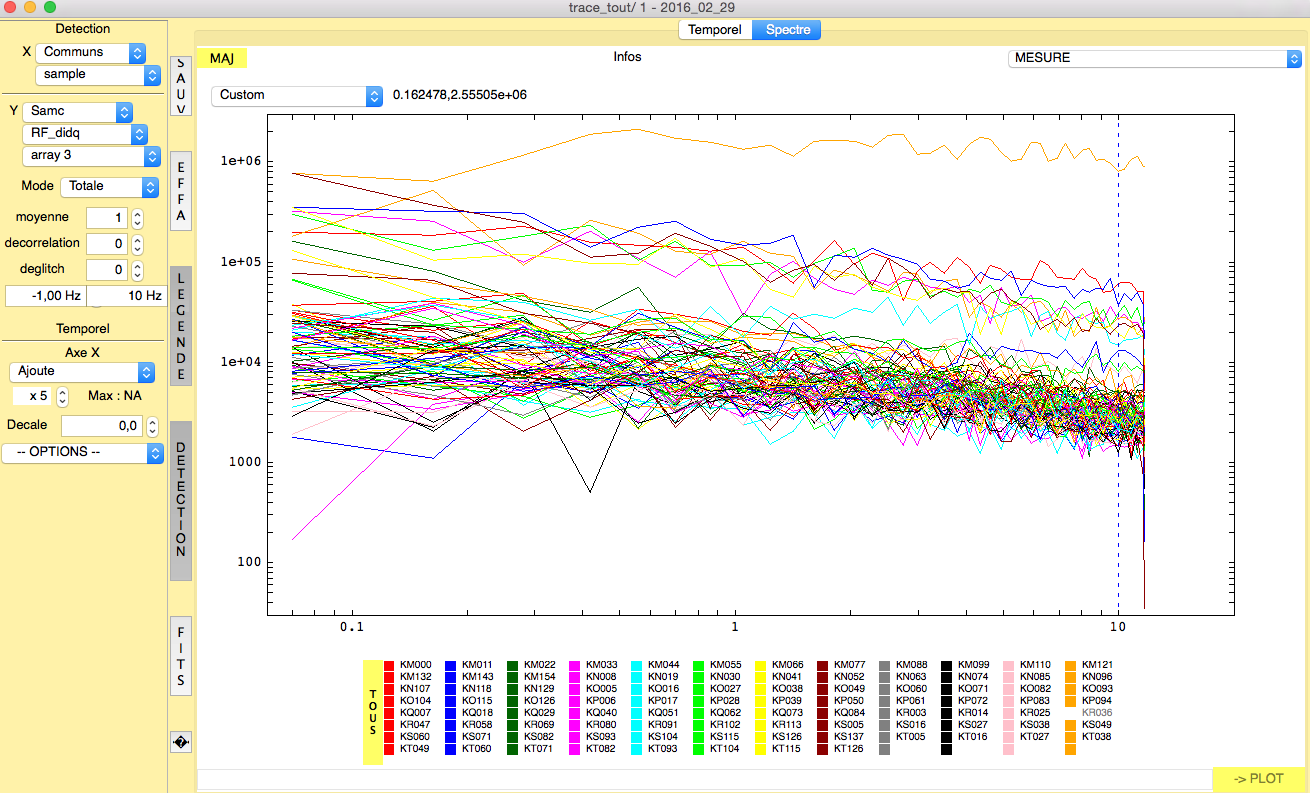
Figure. Noise with the window on respectively the 2mm, 1mm NIKEL_RF (array 1) and 1mm NIKEL_DC (array 3)
